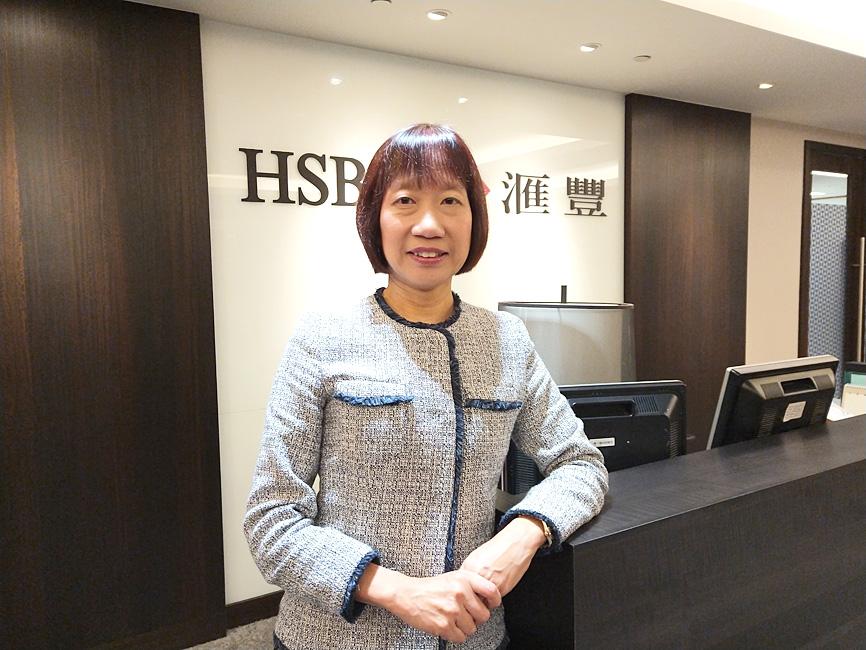HSBC Holdings PLC’s global private banking and wealth management division has an upbeat outlook for Taiwan, the only North Asian market for which it had raised its outlook, as the domestic semiconductor sector is expected to continue to benefit from digitalization worldwide, it said yesterday.
Although the semiconductor sector has posted robust profit growth this year, it is likely to expand further next year thanks to a rising demand for chips, Hong Kong-based chief investment officer for Asia Fan Cheuk Wan (范卓雲) told a news conference.
Next year, semiconductor companies’ earnings per share are likely to grow at a slower pace, due to this year’s high comparison base, but would not lose steam, as more non-tech industries are digitalizing and new applications would be developed for the “metaverse,” a virtual universe facilitated by virtual reality technology, Fan said.

Photo: Lee Ching-hui, Taipei Times
“Some companies raised prices for their advanced process technology or products this year, and the effect on profits might become more evident next year,” chief investment officer for North Asia Patrick Ho (何偉華) said.
In Asia, HSBC has also raised its outlook for Singapore, Thailand and Indonesia, as their economies are expected to benefit from high rates of vaccination against COVID-19, Fan said.
On Tuesday, PGIM Securities Investment Trust Enterprise Co (PGIM, 保德信投信) forecast that the combined profits of local companies next year would grow at a single-digit percentage rate next year, after advancing 70 percent annually to NT$4 trillion (US$143.86 billion) this year.

Photo: Chang Hui-wen, Taipei Times
Profit momentum this year can mainly be attributed to gains in the electronics, shipping and conventional industries, PGIM fund manager Bevan Yeh (葉獻文) told a news conference in Taipei.
Next year, the electronics sector is likely to see a 10 percent rise in profits, but conventional industries are expected to be affected by the rising cost of raw materials as inflation surges worldwide, Yeh said.
It is difficult to predict when freight rates might return to normal levels in the shipping sector, as congestion at seaports worldwide has persisted longer than expected, Yeh added.
“As for the metaverse, we think that it is more like a slogan, as no firm has so far really benefited from new business related to the concept. But it is worth paying attention to how the industry will develop based on the concept,” Yeh said.
Taiwan Semiconductor Manufacturing Co (台積電) is expected to have a rosier second half of next year than the first, as the company has to negotiate with governments worldwide about setting up new factories, Yeh added.
Local stocks next year are likely to experience a “smile curve”: starting high in the first quarter, falling in the second and third quarters, and recovering in the fourth quarter, he said.
The net selling of local shares by foreign institutional investors might continue next year, as it has happened for two consecutive years, he said.

Intel Corp chief executive officer Lip-Bu Tan (陳立武) is expected to meet with Taiwanese suppliers next month in conjunction with the opening of the Computex Taipei trade show, supply chain sources said on Monday. The visit, the first for Tan to Taiwan since assuming his new post last month, would be aimed at enhancing Intel’s ties with suppliers in Taiwan as he attempts to help turn around the struggling US chipmaker, the sources said. Tan is to hold a banquet to celebrate Intel’s 40-year presence in Taiwan before Computex opens on May 20 and invite dozens of Taiwanese suppliers to exchange views

Application-specific integrated circuit designer Faraday Technology Corp (智原) yesterday said that although revenue this quarter would decline 30 percent from last quarter, it retained its full-year forecast of revenue growth of 100 percent. The company attributed the quarterly drop to a slowdown in customers’ production of chips using Faraday’s advanced packaging technology. The company is still confident about its revenue growth this year, given its strong “design-win” — or the projects it won to help customers design their chips, Faraday president Steve Wang (王國雍) told an online earnings conference. “The design-win this year is better than we expected. We believe we will win

Chizuko Kimura has become the first female sushi chef in the world to win a Michelin star, fulfilling a promise she made to her dying husband to continue his legacy. The 54-year-old Japanese chef regained the Michelin star her late husband, Shunei Kimura, won three years ago for their Sushi Shunei restaurant in Paris. For Shunei Kimura, the star was a dream come true. However, the joy was short-lived. He died from cancer just three months later in June 2022. He was 65. The following year, the restaurant in the heart of Montmartre lost its star rating. Chizuko Kimura insisted that the new star is still down

While China’s leaders use their economic and political might to fight US President Donald Trump’s trade war “to the end,” its army of social media soldiers are embarking on a more humorous campaign online. Trump’s tariff blitz has seen Washington and Beijing impose eye-watering duties on imports from the other, fanning a standoff between the economic superpowers that has sparked global recession fears and sent markets into a tailspin. Trump says his policy is a response to years of being “ripped off” by other countries and aims to bring manufacturing to the US, forcing companies to employ US workers. However, China’s online warriors